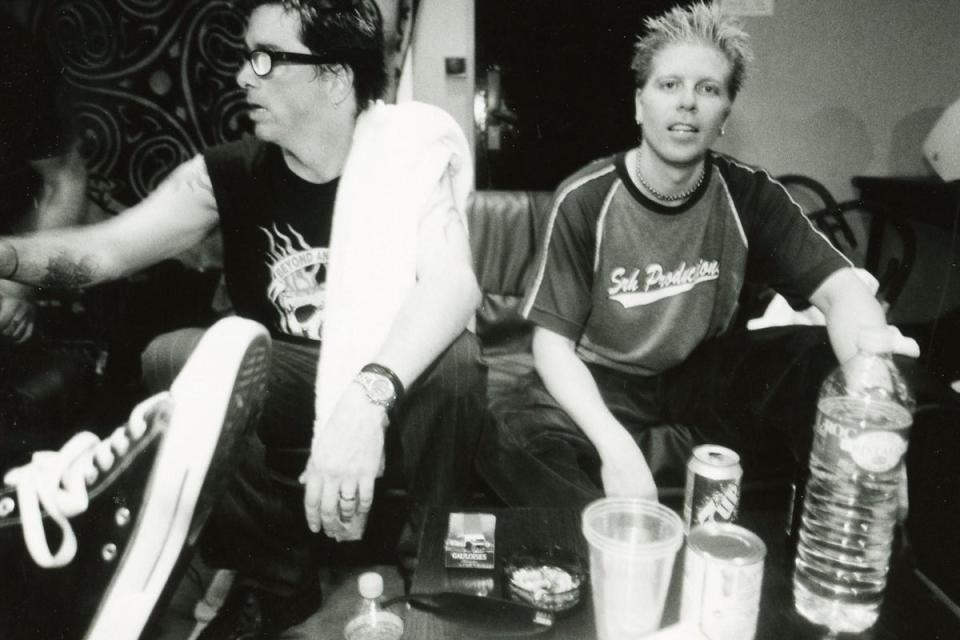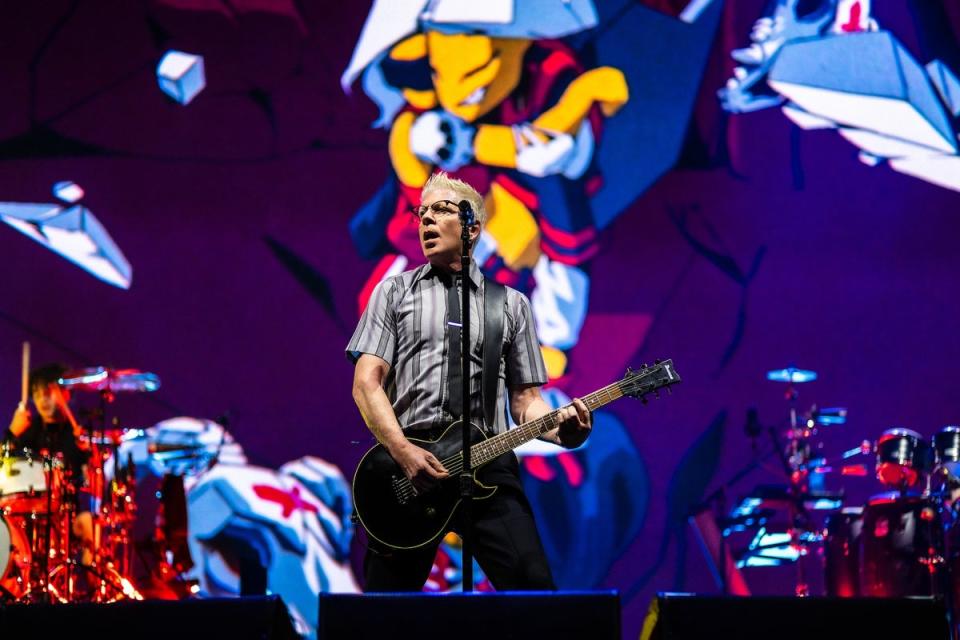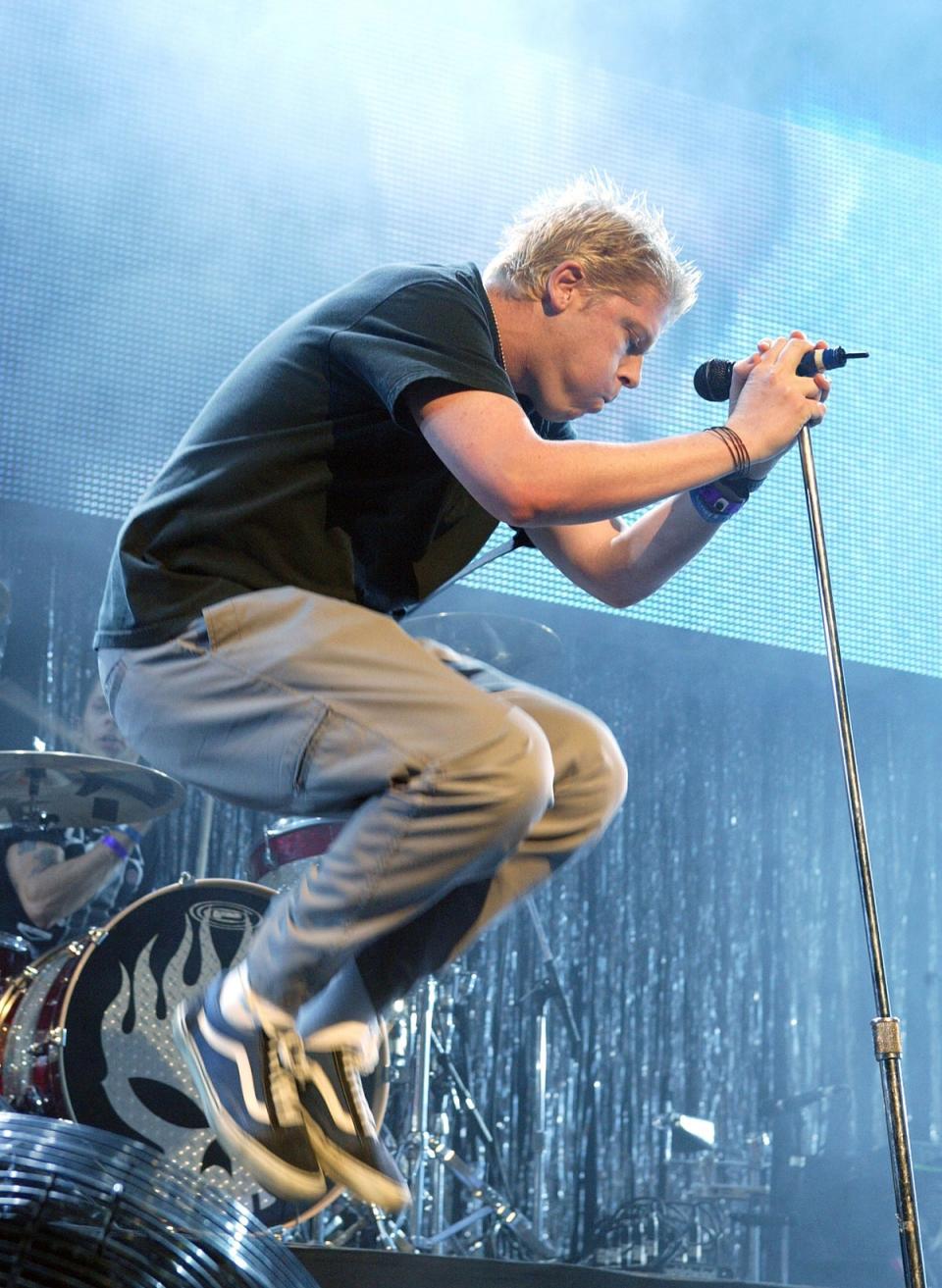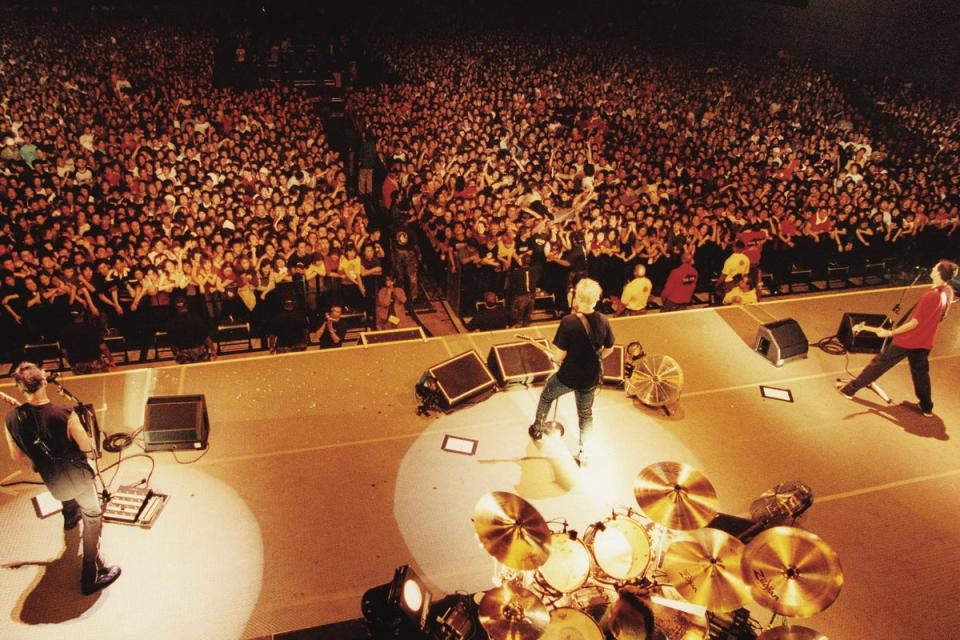


In 1999, The Offspring had an onstage bit: mid-set, they’d wheel out five blow-up dolls mounted on mic stands. Each one was dressed in the late-Nineties boy band uniform of tank tops, baggy Gap jeans and sweater vests. Taped to their heads were cardboard masks. “Ladies and gentlemen…” Dexter Holland, the spiky-haired frontman would announce: “The Backstreet Boys.” Then, he’d take a plastic baseball bat and smash the s*** out of them.
This is exactly the kind of low-stakes juvenilia you might expect from the band who brought us such hits as “Pretty Fly (For A White Guy)” and “Original Prankster”, expressing their discontent with the big-business of glossy, inauthentic MTV pop by ceremonially whacking its figureheads with a toy.
“We would do it right before we did a song called ‘Cool To Hate,’” Holland says. “Back then, everyone was hating this kind of prefab pop, boy bands – especially if you were into rock and roll,” He’s nibbling on biscuits and sipping coffee in a fancy West End hotel. “‘Cool To Hate’ was a very ironic song, but also relatable. I think in anger and hatred you feel some sort of – it’s probably impotent power, but you feel a sort of power.”
Together, Holland and the only other remaining original Offspring member, Noodles, make for a strange double-act. You can’t really imagine them pummelling a sex doll dressed like a Backstreet Boy; they recently brought Ed Sheeran on stage to sing “Million Miles Away” with them, a sure sign that their musical tribalism of the late Nineties is long gone. That said, even now, well into middle-age (Holland is 58; Noodles, 61) they still adhere to the punk-rock uniform of Hot Topic-ish patched suits and spikey, bleach-heavy hair.
Although they concede that the Backstreet Boys schtick wasn’t their finest hour – “yeah, it wasn’t our best moment” – capturing the rage and impotent power of a pissed-off youth has been The Offspring’s speciality since they first broke out of the SoCal punk scene in 1994. Their breakout – which coincided with Green Day’s – laid the way for future pop-punk megastars like Blink-182 and Sum 41, and shaped the pop-rock scene for decades to come. Now on their 11th album and years out from their initial world-beating chart success, this month’s Supercharged is a thunderous record that recaptures some of that youthful verve.
While Holland and Noodles are now affable, ageing rich guys with fun hair, when they started out they were scrappy, geeky kids just looking for a release from the monotony of life in Orange County, California. The band formed as Manic Subsidal in 1984, after Holland and former bassist Greg Kriesel poached a drummer (James Lilja) and guitarist (Kevin Wasserman – aka Noodles) from another band. “I just went, ‘Oh, f***. These guys can write’,” Noodles remembers. “I was in a different band with James, and we sucked – our songs were awful.”
Rebranding as The Offspring, for 10 years they toiled the dive bar circuit while holding down jobs and degrees before LA radio station KROQ-FM started playing a song off their third album. Released in 1994, “Come Out And Play” contained all the blueprints of the band’s future hits, with its twisty middle eastern guitar lick and the repeated refrain “You gotta keep ’em separated”, mixing the serious with the novelty.
It rocketed through the charts and into the mainstream: a rise so fast that Noodles was still working as a janitor at a local high school when their videos started playing on MTV. Holland dropped out of his PhD in molecular biology when the whole rockstar thing looked to be working out (he returned in 2017 to complete it). That album, Smash, went to No 4 in the Billboard charts, nearly sinking their label with its sudden, global demand.

The band rode this wave of success through to 1998’s Americana, which featured the inescapable “Pretty Fly (For A White Guy)” with an ad-lib intro responsible for teaching a generation how to count to six in Spanish (I still repeat “cinco” to this day).
In 2000, “Original Prankster” wrapped the bitter pill of teen mental health in the delicious cheese of catchy Latin rhythms, and goofy interjections from rapper Redman and comedian Rob Schneider. Millions of new fans lapped up the gimmicky punk-rock elixir, but day one fans loathed this new poppier Offspring, yearning for the thrash of their formative records. It inspired huge ire. As Wattie Buchan of Scottish punks The Exploited put it in Kerrang: “What The Offspring are to punk, Cilla Black is to reggae.”
Internal band politics have also scarred the band’s lore: long-time bassist Greg K tweeted that he’d been ejected from the band unwillingly in 2018, resulting in a lawsuit that was eventually settled in 2023; they fired drummer Pete Parada in 2021 over a disagreement about the Covid-19 vaccine. Fans still regularly debate these contentious exits on messageboards and social media. The fact I was told not to ask about it suggests that the dust is far from settled.


The Offspring has been, I suggest, a kind of outlier, then – not quite in the scene but not quite out of it either. “I guess that’s how we feel in our skin,” Holland says. “That’s why we’re in this kind of band, right?”
It’s not the scenesters or the critics or even the fans who they are working to impress: it’s themselves. “There’s a guy [inside] that says, ‘You’re never gonna get anywhere’, and that’s who we’ve gotta prove to that we can still make music that connects with people,” Noodles says, arms and eyes wide as he speaks. “It’s the guy in our own psyche that’s trying to trip us up. That’s who we got to try to prove s*** to.”
The past decade has been an exercise in doing just that. Their last album, 2021’s Let The Bad Times Roll, was a rocky, overwrought gaggle of songs reacting in part to Trump-era America, which largely dispensed with the band’s usual wink and a grin. By contrast, their new record, Supercharged, is big, brash, and fast – with songs that could stand alongside some of their more purist tracks from the Smash era. One song, called “Come To Brazil”, is pure winking, grinning fan service, complete with “Ole ole ole”s.
We don’t consider ourselves a political band. Being a musician, I don’t feel like a role model. I really don’t feel any responsibility to have to have to be that
Dexter Holland
“Not that we… overthought the last album, necessarily,” Dexter says, in a way that implies that perhaps they did. “But this one was just a little bit more… natural.” They aren’t embarrassed by their popular songs – and they don’t mind that some of them are a bit silly. “I used to struggle with putting a song that’s dark on the same record as a song that’s kind of fun and happy. And eventually I decided, well, I’m not always happy. I’m not always sad,” he says.
“Yeah, we did it with ‘The Kids Aren’t Alright’ and ‘Pretty Fly For a White Guy’,” Noodles points out. “It’s kind of what we do. Why does our band have to be one or the other?” The former is an angry, roiling song about the tragedy of poverty; the latter, essentially a joke about a white guy with dreads.
Similarly, in person, the pair couldn’t be more different from one another. Where Noodles loves to expand on every answer with an enthusiasm that is somehow both fatherly and puppyish, Holland sits back, listening shrewdly. I get the impression he’s ready to jump in at any point that his bandmate veers off the established press-ready rails.


I was politely asked before the interview not to bring up politics – punks who won’t talk about politics seemed like a contradiction in terms, but it soon becomes a moot point. When I ask how they feel about America currently, Holland’s face sort of freezes but Noodles romps off with the conversation: “The political situation in the States right now is awful. It’s just terrible. And, you know, I think adding to that is social media in the post-fact world, where you can have an ex-president of the United States say s*** that’s just patently false and a third of the country will believe them.” He shakes his head.
“Before we couldn’t agree on issues,” he continues. “Now we can’t even agree on what the facts are, the basic truths. People are living in completely different realities. And it’s mind-boggling. It’s frightening actually.” Noodles left Twitter in 2022; how is life without it? “Much better!”
“How do you tackle the world’s problems when you can’t agree on the basic facts?” Holland asks, eventually joining in. “And then you add artificial intelligence on top of that, and then we’re really f***ed.” Noodles perks up: “When you use it to write songs… that’s bad. But when you use it like a guitar effect box, I think that can be kind of cool.”


Society’s problems probably aren’t going to be solved by using AI to tweak a guitar effect, but have they ever used AI to write a song? Noodles starts talking about using it to make some voices, while Holland laughs and puts his hand up to interrupt: “My confession.” A friend had suggested feeding some Offspring lyrics into ChatGPT and asking it to come up with something similar, he recalls. “We put in the lyrics to ‘You’re Gonna Go Far, Kid’ in and what it came back with was just complete garbage. I was kind of relieved. Like, ‘I’m smarter than this.’”
The songs on Supercharged do often feel political – and the album certainly possesses that post-lockdown manic energy that has fizzed out into popular music in the past 12 months. “Looking Out For #1” rails against the egocentrism of life on social media; the Bad-Religion-ish “Truth In Fiction” ponders fake news and disinformation; the final two tracks deal with mental health. But that’s beside the point, Holland argues. They’re observing, not preaching. “We don’t consider ourselves a political band,” Holland says. “Being a musician, I don’t feel like a role model. I really don’t feel any responsibility to have to have to be that. I don’t take that on at all.”
With the advent of streaming and social media, the musical landscape has never been so fractured and yet accepting of different genres. The tribalism that saw rock and pop cleaved into two distinct camps and led to Holland beating the Backstreet Boys up on stage is now diluted into smaller, more esoteric subcultures that exist on Discord servers and subreddits. These fandoms overlap and intertwine in ways that seemed impossible in the mono-culture of the late Nineties.
But there’s still room for punk rock to offer community to a disaffected youth, and maybe a couple of 60-something rockstars could still be the ones to harness that “impotent” power. “For me, punk rock made me feel not so alone,” Noodles says. “And then it got me to question everything and look at the world differently. It helped show me the way through the world: I think there’s still kids that will get that, you know?”
‘Supercharged’ is out 11 October via Wabi Sabi Worldwide